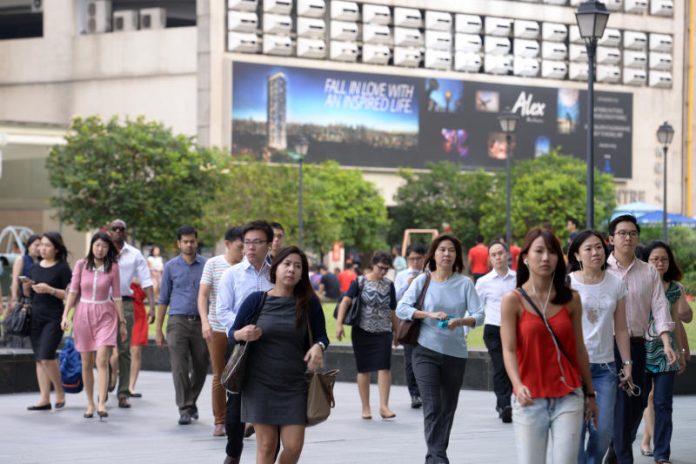Singaporeans will see their salaries increase by 4.0 percent in 2019, according to the latest Salary Trends survey by ECA International (ECA). After factoring in inflation, predicted by the International Monetary Fund to be 1.4 percent next year, employees are expected to see a real salary increase of 2.6 percent in 2019. This keeps Singapore near the middle of the salary increase table in Asia Pacific, ranking 11th out of 20 countries surveyed in the region. The 2019 forecast is lower compared to the increase received in 2018, but Singapore remains ahead of neighbouring Hong Kong.
Lee Quane, Regional Director – Asia at ECA International, said: “Singapore employees are expected to see a real salary increase of 2.6 percent in 2019, down from the 2.9 percent increase that they received this year. This is primarily due to the expected increase in inflation, from 1.0 percent in 2018 to 1.4 percent next year. However, Singapore will continue to see a higher increase than regional neighbours such as Hong Kong and Japan, and is only slightly below the Asia Pacific average of 2.7 percent.”
ECA International is the world’s leading provider of information, software and expertise for the management and assignment of employees around the world. The annual Salary Trends Report analyses current and projected salary increases for local employees in 69 countries across the world.
Asia Pacific countries lead the way; employees in India set to receive highest pay increase globally
Asia Pacific countries dominate the top highest real wage increases, occupying 14 spots out of the global top 20. All but one of the top ten are Asian countries. Quane said: “The average real salary increase in Asia Pacific is predicted to be 2.7 percent in 2019 –more than double the global average of 1.2 percent. Low inflation and rising productivity mean that many Asian economies, and therefore local salaries, are growing rapidly.”
India tops the rankings, with employees forecast to receive a 5.1 percent real salary increase, more than twice the increase employees in Hong Kong will experience. Similarly, employees in other Asian countries with rapidly growing economies such as Vietnam and Indonesia will see significant increases to their average salary, and rank second and third respectively in the global rankings.
In greater China, mainland China will lead the way with real salaries increasing at the fastest rate in 2019, followed by Taiwan, Hong Kong and Macau. Globally, China ranks fourth in real salary increase. “Employees in mainland China are set to continue to see their salaries increase at the fastest rate in the greater China region, both in nominal terms and real terms. Within mainland China, the pay of employees in Shenzhen will likely rise the fastest next year,” said Quane. “Furthermore, employers in mainland China seem to be more positive on the economic outlook, with companies forecasting an increase in salaries in nominal terms of 6.5 percent in 2019, compared to 6.0 percent in 2018. This compares favourably to the rest of Asia Pacific, where the overall average nominal salary increase is set to remain unchanged at 5.5 percent, similar to that in 2018.”
The impact of recent political events in Malaysia has not made a noticeable difference to salaries, as the nominal rates of salary increases will remain at 5 percent in 2019, the same as in 2018. However, with inflation expected to increase at a faster rate in 2019 compared to 2018, Malaysians will not see as high a rate of increase in their real incomes in 2019 as they did this year.
High inflation continues to suppress pay increases in Africa; mixed outlook for Middle East
Although employers in Egypt, Nigeria and Turkey are expected to offer among the highest nominal pay increases next year, high levels of inflation indicate that employees in each of these countries will likely receive real pay decreases of 1 percent, 3.2 percent and 6.7 percent respectively.
Meanwhile, employees in Saudi Arabia and United Arab Emirates (UAE) are expected to see a boost in 2019 compared to 2018, as inflation in most parts of the Middle East are set to ease.
Quane added: “The real salaries in Saudi Arabia and the UAE are slated to increase to 2.0 percent and 2.1 percent respectively after a disappointing 2018, which only saw minimal rises in salary for each country. This is a result of inflation easing after a short-lived spike last year, following the introduction of a 5 percent VAT in January 2018.”
Positive signs of growth in Europe
The average real salary increase across Europe is predicted to stay at 0.8 percent, unchanged from 2018, while inflation in Europe is forecast to be the lowest in the world next year at 1.8 percent on average.
In the UK, employees are also expected to see a real salary increase of 0.8 percent in 2019. However, UK’s impending withdrawal from the EU could significantly impact this figure.
Quane explained: “It is still unclear the impact Brexit could have on inflation and salaries in the UK. Any deal that is made on Brexit could have far reaching implications on wage and price rises, and these figures could change significantly depending on what happens between now and the official withdrawal date in March 2019.”
Argentina at bottom of global rankings as economic woes continue
Argentina sits at the bottom of ECA’s table, with the forecast predicting a -8.7 percent decrease in the average real salary, following a -11.6 percent decrease in real salaries in 2018.
Quane said: “The bad news continues for employees in Argentina with another predicted decrease in their real wages next year. The economic policies of President Macri that were designed to reverse years of economic turmoil have failed, resulting in an International Monetary Fund bailout of over USD $56 billion. With inflation set to remain sky-high at 31.7 percent, far outstripping salary increases, another decrease in Argentinian real salaries seems to be inevitable.”
The information above was taken from ECA’s Salary Trends Survey 2018/2019. The survey reports current-year salary increases for local national employees and the anticipated increases for reviews in the forthcoming year. It is based on information collected from 289 multinational companies for 69 countries. Reports are available free to all participants or for purchase either as a set or individually per country for non-participants from the ECA website. Data is based on increases including merit. Including merit is the total salary increase and represents general cost of living/inflationary increases plus performance/merit related increases. The data above was collected from August to September 2018. The survey included data from all seniorities across the following industry groups which included Energy, mining & petrochemicals; Chemical & pharmaceutical; Transport & logistics; Manufacturing & consumer goods; Legal & professional services; Engineering & technology; Retail, leisure & other services; Financial services; Non-profit.





















